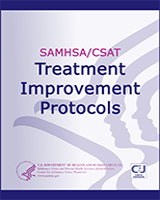From: Chapter 7. Clinical Issues, Challenges, and Strategies in Intensive Outpatient Treatment

Substance Abuse: Clinical Issues in Intensive Outpatient Treatment.
Treatment Improvement Protocol (TIP) Series, No. 47.
Center for Substance Abuse Treatment.
Rockville (MD): Substance Abuse and Mental Health Services Administration (US); 2006.
NCBI Bookshelf. A service of the National Library of Medicine, National Institutes of Health.